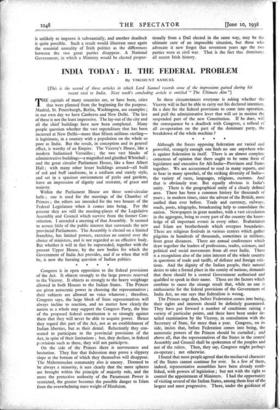Congress is in open opposition to the federal provisions of
the Act. It objects strongly to the large powers reserved to the Viceroy. It objects as strongly to the heavy weightage allowed in both Houses to the Indian States. The Princes are given autocratic power in choosing the representatives ; their subjects are allowed no voice whatever ; therefore, Congress says, the large block of State representatives will always incline to reaction, and no matter how clearly the nation as a whole may support the Congress Party, the bias of the proposed federal constitution is so strongly against them that they will never be able to acquire power. Hence they regard this part of the Act, not as an establishment of Indian liberties, but as their denial. Reluctantly they con- sented to participate in the provincial provisions of the Act, in spite of their limitations ; but, they declare, in federal p:;3visions such as these, they will not participate.
On the side of the Princes there is nervousness and hesitation. They fear that federation may prove a slippery slope at the bottom of which they themselves will disappear. The Mahommedan community also is uneasy. Doomed to be always a minority, it sees clearly that the more spheres are brought within the principle of majority rule, and the more the protective authority of the Paramount Power is restricted, the greater becomes the possible danger to Islam from the overwhelming mass weight of Hinduism. In these circumstances everyone is asking whether the Viceroy will in fact be able to carry out his declared intention, fix a date for the federal provisions to come into operation, and pull the administrative lever that will set in motion the suspended part of the new Constitution. If he does, will the consequence be a deadlock with Congress, a refusal of all co-operation on the part of the dominant party, the breakdown of the whole machine ?
* * * *










































 Previous page
Previous page